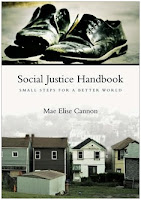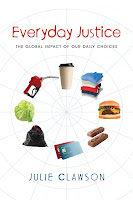Thrift Store Saints
Jane Knuth
What happens when a middle-class, American suburbanite encounters the uncomfortable world of inner-city poverty? In Thrift Store Saints, Jane Knuth answers by sharing her experiences volunteering in a local St. Vincent de Paul thrift store.
Through meeting the “saints” who frequented her shop, Knuth undergoes a profound transformation in her own spiritual life. She begins to see the poor not as burdens but as “opportunities to meet Jesus.” Thrift Store Saints is the perfect type of social-justice book: it uses personal stories and it doesn’t leave you feeling guilty about what you’re not doing. Instead, it inspires you–through example, not guilt–to want to do more. Thrift Store Saints teaches you, in the words of Mother Teresa, how to find Christ in his “most distressing disguise.”
The Social-Justice Handbook
Mary Elise Cannon
If someone told me they were looking for some good resources on social-justice, The Social Justice Handbook is the first book I would recommend. The book’s first half provides a biblical and historical overview of justice throughout Scripture and church history. The second half features dozens of encyclopedic articles on issues like cloning, micro-finance, and incarceration. Each article explains what you need to know about the issue and also what you can do about it. In addition, the book offers hundreds of recommended resources in case you want to go deeper into any one topic.
While many social-justice books focus either on “life” issues (abortion, euthanasia, bioethics, stem-cell research) or “justice” issues (poverty, race, war, the environment.), this book covers them all. However, being clearly written for a wide audience, The Social Justice Handbook doesn’t take strong positions on many of the issues (and since the author is an Evangelical, you won’t find necessarily find the Catholic view on each issue.) Nevertheless, I still count the book as the most comprehensive overview on social-justice.
(For an explicitly Catholic handbook on social-justice, I recommend Michael Pennock’s Catholic Social Teaching. It’s very easy-to-read, yet still comprehensive.)
Everyday Justice
Julie Clawson
Julie Clawson understands that most of us feel overwhelmed and guilty whenever we hear about justice. That’s why she wrote Everyday Justice–to provide positive, doable steps that improve the “justice quotient” of our lives. The book gives examples of typical people who have made tweaks–not overhauls–in order to live more compassionately.
From fair-trade coffee to ethical clothing, political advocacy to reducing gas consumption, Clawson offers numerous suggestions. For each topic she provides background, biblical tie-ins, and practical resources. It’s refreshing when a social-justice book leaves you saying,”Ah, I think I can actually do that.” And that’s precisely what Everyday Justice does.
Practical Justice
Kevin Blue
Kevin Blue has devoted his life to inner-city ministry in Los Angeles, and Practical Justice summarizes what he’s learned. The book is raw; it doesn’t gloss over the realities of this type of work. Kevin notes that he’s been scammed multiple times and has also had his bike stolen. So, far from painting a pretty picture of justice-work, Blue honestly recounts the ups and downs, difficulties and joys of caring for the poor. He focuses primarily on urban poverty, racism, and class-struggles within America, but his concern and passion can be applied to many other justice issues.
Blue is a bit harsh at times in his critique of American suburbanism, and despite the title his book is not as practical as others in this genre. But beyond those shortcomings, Practical Justice offers a unique grassroots look at serving today’s poor from someone actually in the trenches.



